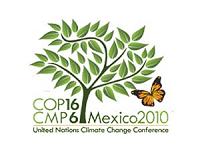 |
Cancun, Mexico (AFP) Dec 8, 2010 The world's climate negotiators worked Wednesday to turn a growing consensus into concrete progress as talks in Mexico made headway on a range of issues including aid for the poorest countries. One year after the Copenhagen climate summit ended in widespread disappointment, the United Nations and host Mexico have tried to keep hopes in check by focusing on concentrating only on building blocks to a future deal. With three days to go in the two-week conference, negotiators voiced hope at coming to agreement on three key areas: the architecture of a global climate fund, aid to stop deforestation and verification of countries' climate pledges. "I believe an agreement is within reach. But that does not mean that we already have it within our grasp," said Mexican Foreign Secretary Patricia Espinosa, who is guiding the talks at the beach resort of Cancun. UN Secretary General Ban Ki-moon flew in Tuesday to help steer the conference, warning the more than 190 participating nations that climate change was already causing real damage to the planet. "I do not expect governments to reach an all-encompassing global agreement here in Cancun," Ban told reporters. "But we need to see progress on all fronts of the negotiations." A new draft proposal spelled out the technicalities for setting up a global climate fund to administer assistance to some of the poorest nations that are most vulnerable to global warming. The European Union, Japan and the United States all pledged before the Copenhagen conference to contribute to a 100 billion-dollar-a-year climate package for poor nations. In a revision, the text explicitly calls for a role for women in the fight against climate change. But some environmentalists criticized the draft for removing a reference to ensuring that 50 percent of assistance goes toward helping people adapt to climate change. The omission would allow wealthy nations to meet pledges through other means, such as offering technical know-how to help curb emissions of greenhouse gases blamed for global warming. "We're at a critical moment on the financing issues. We've had significant progress on what is a key area ... but there are also significant risks of a watered-down approach," said David Wastkow of Oxfam America. "We need to put real meat on the bones and not put things on the sidelines," he said. The talks have also made headway on detailing ways in which wealthy nations would help developing nations curb deforestation -- a key source of climate change as such lush vegetation balances off industrial pollution. Conference watchers said Brazil raised concerns about outside monitoring of its efforts in the Amazon. Activists who have taken to the streets of Cancun have demanded a larger role for indigenous people and voiced suspicion over setting up a market, which would allow countries to assist deforestation efforts in return for credit in their emission cuts. Despite movement on an array of issues, one major controversy has hung over the talks -- what to do about the Kyoto Protocol, whose commitments to curb greenhouse gas emissions end at the end of 2012. Faced with the growing likelihood that no new treaty will be in place soon, the European Union has led calls for nations to make another round of pledges post-2012 under the Kyoto treaty. Japan has led opposition, saying that such an extension is unfair as Kyoto does not cover the two biggest emitters: China, which has no obligations as a developing nation, and the United States, which rejected the treaty in 2001. But Brazil's climate negotiator, Izabella Teixeira, said she saw "advances" on the Kyoto deadlock, which Mexico had tasked Brazil and Britain with trying to unlock. "There were advances," Teixeira told reporters. "Yesterday the discussion went better with Japan, Russia and others." Environmentalists following the talks say Canada and Russia have also been against a new Kyoto round, although they were happy to let Japan be the public face of the opposition.
Share This Article With Planet Earth
Related Links Climate Science News - Modeling, Mitigation Adaptation
 WikiLeaks adds twist to climate hopes
WikiLeaks adds twist to climate hopesCancun, Mexico (AFP) Dec 6, 2010 Climate negotiators Monday hailed a brighter mood in often torturous global talks, but disclosures by WikiLeaks of hard-nosed behind-the-scenes diplomacy threatened to reopen fissures. A two-week session in the Mexican resort of Cancun is looking to make incremental progress toward a new treaty to fight climate change, which UN scientists warn threatens severe effects for the planet if unche ... read more |
|
| The content herein, unless otherwise known to be public domain, are Copyright 1995-2010 - SpaceDaily. AFP and UPI Wire Stories are copyright Agence France-Presse and United Press International. ESA Portal Reports are copyright European Space Agency. All NASA sourced material is public domain. Additional copyrights may apply in whole or part to other bona fide parties. Advertising does not imply endorsement,agreement or approval of any opinions, statements or information provided by SpaceDaily on any Web page published or hosted by SpaceDaily. Privacy Statement |